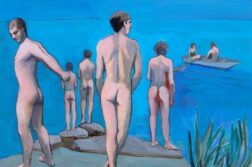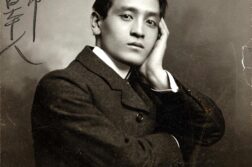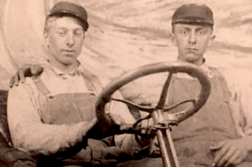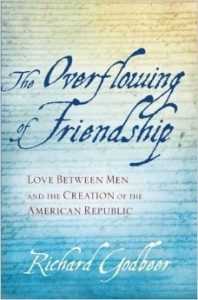 The Overflowing of Friendship: Love betweenMen and the Creation of the American Republic
The Overflowing of Friendship: Love betweenMen and the Creation of the American Republic
by Richard Godbeer
Johns Hopkins. 272 pages, $35.
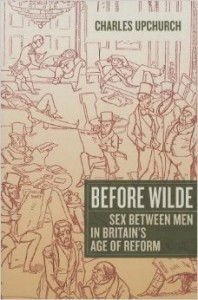 Before Wilde: Sex Between Men in Britain’s Age of Reform
Before Wilde: Sex Between Men in Britain’s Age of Reform
by Charles Upchurch
University of California Press
288 pages, $45.
I DO NOT UNDERSTAND why historians and academics, including many gay ones, refuse to believe that homosexuality has been pretty much the same since the beginning of human history, whether it was called homosexuality, sodomy, buggery, or had no name at all. Isn’t it time for us to put a stop to this nonsense that produces retrograde books like a recent one by Richard Godbeer called The Overflowing of Friendship, another in the long line of what I call the Doris Kearns Goodwin School of History as Highway Robbery.*
Gay people are victims of an enormous con job, a tragic heist, and it has been going on for too many years. It is time to call its bluff. This means recognizing that we have been here since the beginning of the history of people. It means accepting that men loving men, men having sex with men, has been here since the beginning of history. Every single “case study” quoted by Richard Godbeer (professor of history and gender studies at the University of Miami) knows what I am talking about—and knows why people didn’t write about it in the 18th century. Sodomy was against the law and, depending on the moment in time or place, punishable by death. So of course these guys are not going to write in their letters “An Ode to Your Gorgeous Penis and/or Tush” or the like. Even today, such honesty is rarely available in the Dear Diarys of the Great Modern Gays.
In a previous book, Godbeer appears quite willing to entertain the notion that early colonists had active sex lives even in the absence of women. He cites Jamestown as an example and then offers the following: “Settlers in the 17th-century Chesapeake often paired off to form all-male households, living and working together. … It would be truly remarkable if all the male-only partnerships lacked a sexual ingredient. … It seems reasonable to assume that much of the sex that took place … was sodomitical [my emphasis].”
In this new book, however, Godbeer is hell-bent on convincing us that two men in colonial America could have exceedingly obsessive and passionate relationships (he calls them, variously, “sentimental,” “loving,” “romantic”) replete with nonstop effusive correspondence that rivals anything in Barbara Cartland, and spend many a night in bed together talking their hearts out, without the issue of sex arising in any way. He tries very hard to convince us that then was so different from now, that men, in essence, in all of this behavior, had no sex drive, indeed no functioning penises that perked up when the luscious emotions and activities one is writing or reading about were experienced. Most of these friendships were not in the least sexual, insists Godbeer—you know, a sort of “I love you, man” for Colonial America.
By the way, many of these young men that Godbeer writes about sound to me like what we used to call weenies, wimps, sissies, wusses—whatever expression you want to use for the guys who never got chosen for the team. There is not a butch or masculine-sounding fellow among them. Read enough of their endless platitudinous meanderings and you’ll long for some real men to come along and grab their crotches and plant a deep, long kiss, avec tongue.
Godbeer’s early chapters detail young men obsessively in love with each other, wanting to sleep (no sex!) with each other night after night, and often doing so, exchanging that word “love” quite generously. One young man relates a dream in which he pulls his friend out of the water: “he seemed to be stark naked and as we were running along hand in hand to the place where his clothes were—I awakened—greatly agitated by the danger from which we seemed to have escaped.” Tormented when apart, greedy for more when together, his lover is “determined we should never part again.” “I will give myself up to you, I will go wherever you go and one shall not go without the other.” “I love you very much.” “Yours for ever—and ever—and ever.” These two men were 27 years old.
Godbeer keeps reminding us, as if this explains anything, that there was no word for homosexual back then. To which I reply: so what? Men in love with other men, by this very act alone, knew who they were without having a word for it. And anyway, there were hundreds of words for homosexual. I have a dictionary filled with them: The Queen’s Vernacular, it’s called, which documents centuries of what we called ourselves.
Do you know that men loving men do not require the sexual act to qualify them as homosexuals? My American Heritage unabridged dictionary lists two definitions for homosexuality: “sexual orientation to persons of the same sex” and “sexual activity with another of the same sex.” In other words, it is not necessary to have had sex with anyone for a person to be homosexual. By insisting on the second definition, academics make it all but impossible to claim a person from the past as one of our own. Our history gets eliminated as if we never existed. Perhaps this is why the second definition rules.
By the first of these definitions, every person in Professor Godbeer’s book would qualify as homosexual, certainly to me, with or without proof of a consummated sexual act. Just because his research has not uncovered smoking cocks does not mean these loving friendships weren’t shooting themselves off all over the thirteen colonies and into the Louisiana Purchase, soon to come. To use Godbeer’s own words, it seems reasonable to assume that this would be the case.
How does Godbeer know that most of the intimate friendships he describes were sexually chaste? He has no more evidence to prove his case than do those, like me, who may be quick to discern orgies in colonial beds. The argument goes both ways. If one side cannot wave Monica Lewinsky’s semen-stained dress, neither can the other side wave immaculate bed linens.
JUDGING BY how much Godbeer quotes from them, much of this romantic friendship stuff appears to have been whipped up by newspapers, of all things, “for the love of one’s country.” “It would flow outward and transform society as a whole.” “It is like a crystal fountain, uncontaminated at its source, issuing its stream along the vale and over the fertile mead, which makes the flowers in spontaneous order spring and flourish, and the valleys smile with pleasure, uniting fragrance over the wide expanse.” What upstanding gay man would not respond to this challenge! Go to bed with your best chum and shoot the shit and be an example for all America.
Just because he can’t find the hard-core stuff does not mean that same-sex sex did not take place. Even Ron Chernow in Alexander Hamilton (2004) and James Gaines in For Liberty and Glory: Washington, Lafayette, and Their Revolutions (2007), in laying out all the intertwining relationships between Washington, Hamilton, Lafayette, and John Laurens (Hamilton’s great love), admit that they could have all been having sex. Of course, each historian says he doubts it (no reasons given), but at least they admit the possibility, which is a bit of progress. “While there is no irrefutable proof that Laurens and Hamilton were lovers,” there is “sufficient circumstantial evidence to render indefensible any unqualified pronouncement that they were not,” Godbeer quotes, in a footnote from William Benemann’s Male-Male Intimacy in Early America: Beyond Romantic Friendships. But Godbeer says, not in a footnote, “Yet we cannot simply assume that men who loved one another must have wanted to have sex.” But why not? He offers no explanation, but his book is overflowing with statements of the following kind:
Figuring out what these romantic friendships meant to people living in the eighteenth century involves setting aside modern assumptions about love between members of the same sex.
The modern assumption that most people are attracted—sexually and romantically—to either men or women would have surprised early Americans.
Early Americans in general were taught to believe that all sex outside marriage … was driven by innate moral corruption inherited from Adam and Eve.
We know that there were men in British America who found themselves attracted to other men, yet the modern category of “homosexual” would have made little sense to them or their neighbors. … Strictly speaking, men who practiced sodomy during this period did not engage in homosexual acts, any more than the planter giving his wife “a flourish” was engaging in a heterosexual act.
To all of the above, I cry out, So what! Followed by a resounding bushwa! What with all those Cotton Mathers and Jonathan Edwardses rushing around ranting about any kind of sex being a sin, I think gay men were probably scared shitless by what they might have been feeling and thinking.
Godbeer even insists that this form of friendship is what made America great: everyone pitching in, showing the world that we’re All Together in our hearts and strong, loving, romantic, sentimental, patriotic. Thus, this from Godbeer: “As we will see that spiritual version of male fraternity had radical implications: in the second half of the 18th century, it would combine with the culture of sensibility and the ideology of the American revolution to produce a powerful moral vision for post-revolutionary society that placed love between men at its very center.” And this: “It would acquire a particular and explicitly political significance for North Americans during the revolutionary period when the encouragement of intense and loving male friendships came to be seen as crucial to the nation–building project and its creation of worthy republican citizens.”
This perfervidness is perhaps where Joseph J. Ellis found his notion of Washington, Hamilton, et al. as a band of founding brothers. Well, there is another version of that: George the Father leading his troops into battle by day and, among many other sweet, same-sex deeds, assigning one or another of his favorites to rotate sleeping in his tent at night. Read the great, pioneering, Boston-based gay historian Charley Shively, and you’ll never be able to read Joseph J. Ellis (or James McGregor Burns, Douglas Southall Freeman, David McCullough, Arthur Schlesinger, Jr., Edmund S. Morgan, et al.) with a straight face again.*
Does Godbeer admit to the possibility that the dark ogre of sex lurks over or inside or under any of this? When he does so, it is grudgingly and in his usual context of doubt:
Though we should beware of leaping to unwarranted conclusions about the kinds of intimacy that “dear chums” enjoyed when lying “warm” together [why?], it is of course not inconceivable that in some instances “those pleasures” might have included erotic stimulation or even sexual activity. Some letters are a good deal more suggestive than others in expressing nostalgia for nights spent with a close friend. Virgil Maxcy, who lived in Smithfield, Rhode Island, assured his “chum” William Blanding in Rehoboth, Massachusetts, that he missed sleeping with him: “Sometimes,” he wrote, “I think I have got hold of your doodle when in reality I have hold of the bedpost.” A “doodle” that could be confused with a bedpost was hardly in a state of repose, and Maxcy signed this particular letter, “your cunt humble.” One cannot help but wonder.
Cannot help but wonder? What would it take to convince this guy? This is anemic, heterosexist, sex-panicked, transparently crude obfuscation. The claim that nothing can be said for sure because there are no reliable sources, none of the hard stuff on which historians are supposed to base their accounts, is beginning to wear thin. It is incomprehensible to me how queer theory, gender studies, indeed much of gay history, can continue to get away with making the a priori assumption that these men’s sentiments are somehow inaccessible to us, even when it’s staring us in the face!
ACTUALLY, the jig might already be up, as an important new book offers a healthy dose of the hard stuff: evidence for same-sex sexual activity in another setting where it has traditionally been denied, namely 19th-century England. Charles Upchurch, an assistant professor of history at Florida State University, has spent ten years of his life researching Before Wilde: Sex between Men in Britain’s Age of Reform, and it shows. The book overflows with case after case of hard, irrefutable evidence that English men did with other men pretty much what same-sex couplings do with each other all over the world to this day. The big difference here is that Upchurch begins his extraordinary documentation of these cases in the early 19th century. Upchurch claims to have collected over 1,000 published newspaper articles documenting such cases.
Certainly nothing like this has appeared before in and about America, thus allowing queer and gender studies to pretty much swamp gay history with their gobbledygook theorizing on our inability to know anything definitive about sexual behavior in past eras or to relate it to our own sexual “categories.” Well, now it can be said and proved, in Britain at any rate, thanks to this research. Indeed, “an aching gap has been filled,” proclaims British sexual theorist Jeffrey Weeks in one of the blurbs on the back cover.
One reads this book with grateful amazement. Here is a scholar, an academic, who has really done his homework. He has read, it would seem, almost every relevant British newspaper and court record from the early 1800’s up to about 1870. The amazing thing, of course, when his findings are excavated and exposed to the bright air of daylight, is that all of this information has been there all along—in the files of The Times of London, in the court records of cases that it and other newspapers reported, often rather non-judgmentally: cases involving men accused of sodomy or attempted sodomy, of “indecent assault” (at various times punishable by death), of cross-dressing, of hustling, of cruising, of two men trying to set up house or cohabiting in any way—all those things that gay men know all about and take for granted today.
It is breathtaking to read all these accounts in their original context, and on finishing Upchurch’s book one heaves a huge sigh of relief. Of course this is how it was! Why did we all not know and accept this instinctively without having to create and buy into the nightmare theories of Michel Foucault and Judith Butler (to name but two) with the obtuse vocabulary they invented to impose their own preconceived order on the real world? To wit: homosexuality did not exist because there was no word for it.
Those days may be fading fast. With more books like Before Wilde and more scholars like Upchurch, we might one day even be able to say unapologetically that George Washington and Abraham Lincoln, among others, were our brothers in love.
Author’s Note: This piece is a compilation by The G&LR editor of two book reviews by Larry Kramer. The complete Godbeer review is available at huffingtonpost.com and the complete Upchurch at thedailybeast.com.



